Key takeaways:
- Emotional lyrics foster connections through authenticity and relatable language, allowing listeners to resonate with the songwriter’s experiences.
- Songwriting awards validate artists’ efforts, enhance exposure, and motivate writers to refine their craft through recognition and objective standards.
- Personal experiences, vivid imagery, and specific perspectives are essential techniques for crafting emotional lyrics that engage the audience.
- Effective submission strategies for awards include understanding criteria, networking with past winners, and thorough preparation to enhance the quality of entries.
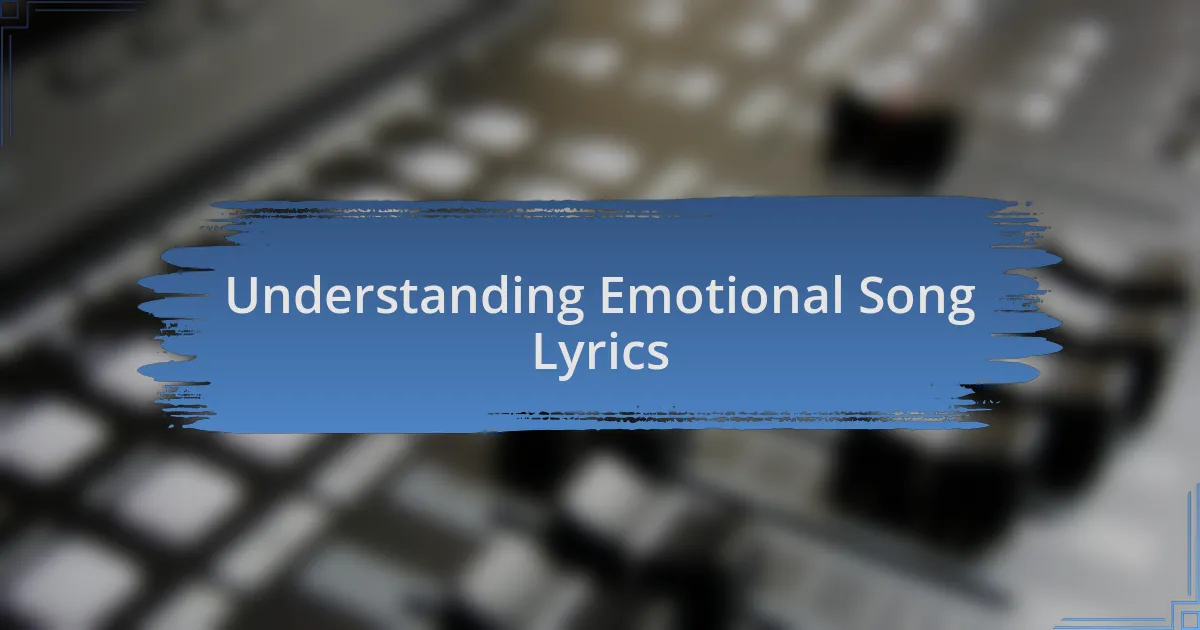
Understanding Emotional Song Lyrics
Emotional song lyrics resonate because they tap into universal experiences. I remember writing a song during a tough breakup, pouring every feeling onto the page. It struck me how capturing raw emotion—not just sadness, but the whole journey—allowed listeners to connect their own stories to mine.
The choice of words in emotional lyrics can evoke powerful imagery and feelings. I once crafted a verse using a rainy day metaphor, reflecting both isolation and longing. That simple image transformed the lyrics into a vivid scene, making it easier for listeners to feel what I felt. Have you ever listened to a song and felt like it was written just for you? That connection often comes from authentic expression wrapped in relatable language.
Another key element is the balance between vulnerability and strength. When I write, I often grapple with how much of myself to reveal. For instance, admitting my fears in a chorus can be daunting, yet it creates a bridge of trust with my audience. Isn’t it fascinating how openness can create such a strong bond between the songwriter and their listeners?
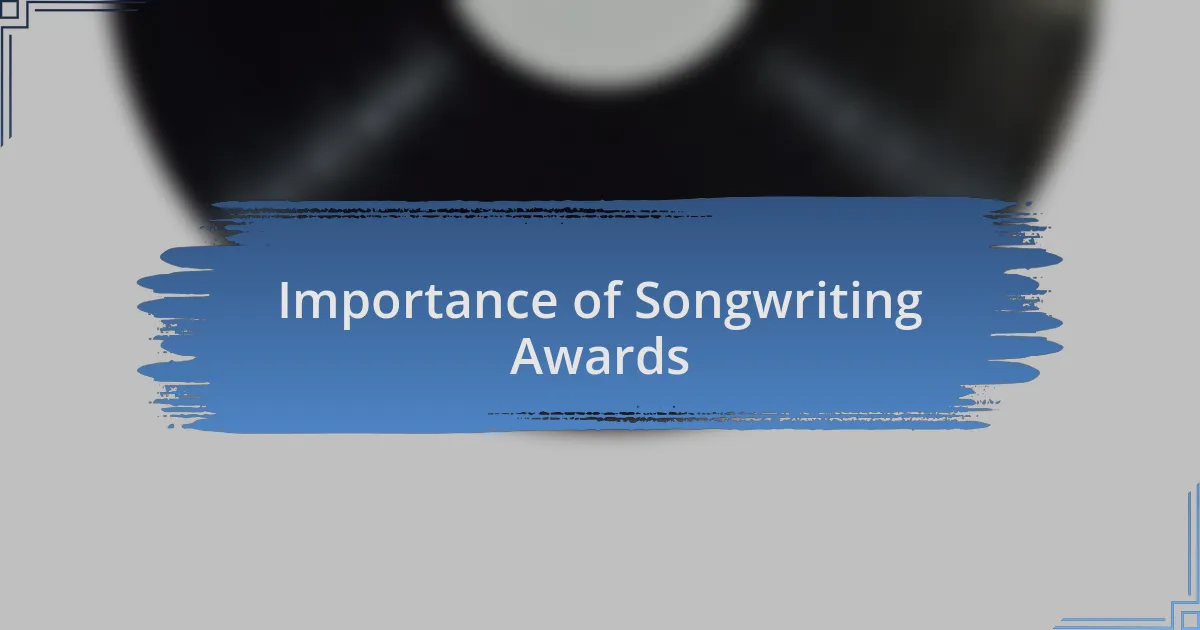
Importance of Songwriting Awards
Songwriting awards play a vital role in recognizing and celebrating the artistry behind crafting lyrics that resonate deeply with audiences. I recall the first time I entered a local contest; winning not only boosted my confidence but also validated the emotions I poured into my songs. Have you ever felt that rush of pride when your hard work is acknowledged? It’s a powerful motivator to continue honing your craft.
These awards often shine a spotlight on emerging talents, providing them with opportunities that might not come otherwise. I’ve seen countless songwriters use their accolades to gain exposure and find their unique voice. Isn’t it inspiring to think about how a simple recognition can ripple through someone’s career, opening doors to collaboration and new audiences?
Moreover, the objective criteria associated with songwriting awards can push writers to elevate their lyrical skills. For instance, I often analyze previous winners and their styles, which challenges me to innovate my approach. This pursuit of excellence fuels creativity and ensures that the songwriting community continues to evolve. How do you push yourself to grow in your writing journey? For me, it’s often through the inspiration I draw from those who have been recognized for their artistry.

Techniques for Writing Emotional Lyrics
One effective technique I’ve discovered for writing emotional lyrics is to tap into personal experiences. When I draw from moments that have deeply moved me—whether it’s heartache, joy, or longing—I find that the authenticity shines through. Have you ever listened to a song and felt like the artist was telling your story? That connection happens when we share our vulnerabilities.
Imagery plays a crucial role as well. I remember crafting a chorus about a storm to symbolize inner turmoil. By painting a vivid picture with words, I can evoke emotions that resonate with listeners on a visceral level. Isn’t it fascinating how a metaphor can transform a simple feeling into an unforgettable experience?
Additionally, I often choose a specific perspective to give my lyrics depth. Writing from the viewpoint of someone else allows me to explore emotions I might not have experienced directly. For instance, I once wrote a song through the eyes of a parent watching their child leave home; the depth of that perspective offered a new layer of emotional intensity. Have you tried stepping into someone else’s shoes in your songwriting? It can open up pathways to poignant storytelling.
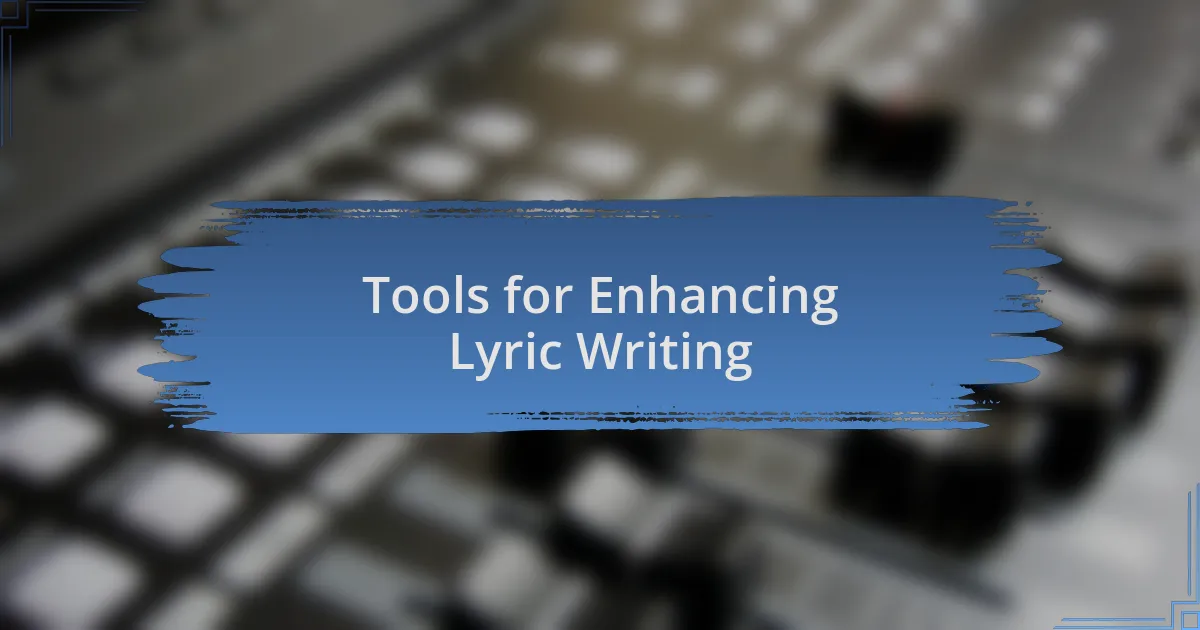
Tools for Enhancing Lyric Writing
When it comes to enhancing lyric writing, I’ve found that using songwriting apps can be a game changer. There are tools like Evernote or Google Keep that help me jot down lyrical ideas whenever inspiration strikes. I remember once waking up in the middle of the night with a snippet of a melody and quickly typing it out on my phone. Having these tools readily available means I never lose those fleeting moments of creativity.
Another powerful tool is the rhyming dictionary. It might sound simple, but when I’m stuck trying to find the perfect word, flipping through a rhyming dictionary can spark unexpected ideas. For example, I was working on a verse and couldn’t find a way to convey my emotions. After searching for rhymes, I stumbled upon a word that led me down a completely different lyrical path. Have you ever had that “aha” moment when a single word completely shifts your narrative?
Furthermore, collaborating with other songwriters can significantly enhance my lyrical craft. I’ve participated in writing circles where sharing ideas not only pushes me out of my comfort zone, but also exposes me to diverse perspectives. Recently, a co-writer suggested an entirely new angle for a song about loss, which transformed my approach. Don’t you think collaboration can ignite a fresh spark of creativity that may be hard to find alone?
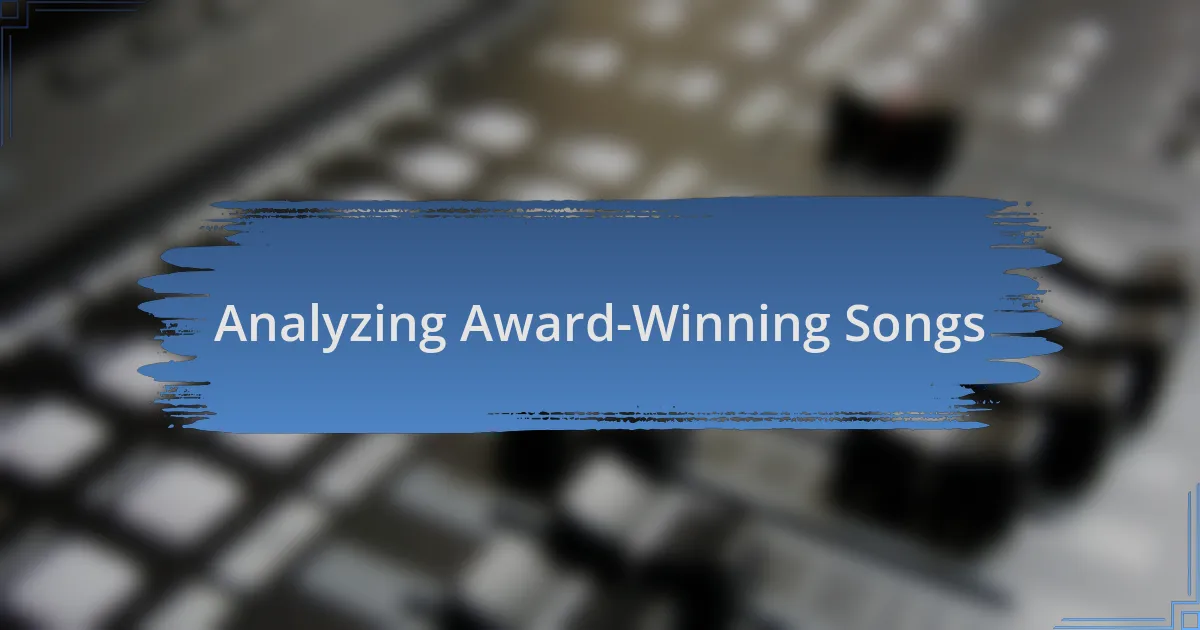
Analyzing Award-Winning Songs
Award-winning songs often share a common thread in their emotional resonance. When I analyze hits like Adele’s “Someone Like You,” I’m struck by how vivid imagery and raw vulnerability bring the lyrics to life. The moment she sings about heartbreak, you can almost feel the weight of her pain. How does such a powerful connection happen? It boils down to authenticity; when lyrics reflect true emotions, listeners can’t help but feel the same.
Delving deeper, I notice that award-winning songs frequently employ storytelling techniques. Take Taylor Swift’s narrative style as an example. In songs like “All Too Well,” she intricately weaves memories and details that transport listeners into her world. I remember listening to that song and feeling as if I was reliving a personal experience of my own. It’s a testament to how details not only build context but also evoke a shared sense of nostalgia. Have you ever found yourself immersed in a song’s story, feeling like it was written just for you?
Moreover, the structure of these songs plays a crucial role in their success. I’ve found that the balance between catchy hooks and poignant verses is key. For instance, in Billie Eilish’s “When the Party’s Over,” the contrast between her haunting vocals and stripped-down instrumentation creates a powerful emotional impact. This deliberate choice makes me reflect on how dynamics can elevate lyrical storytelling. Don’t you think that sometimes, less truly is more in crafting an emotional experience?

My Personal Songwriting Journey
Music has always been a refuge for me. I recall the first time I penned my own lyrics; it was after a particularly tough breakup. Writing those lines felt cathartic, transforming my heartache into something tangible. I wonder, how many of us find solace in creating? For me, that experience revealed the power of expressing emotions through words.
As I continued my songwriting journey, I learned to draw inspiration from everyday encounters. I once scribbled a verse on a bus ride when a couple’s argument caught my attention. The raw emotions shared in that moment hit me hard and made me realize how life’s ordinary moments can fuel creativity. How could I turn fleeting experiences into lyrical gold? It’s in those snapshots of life that I’ve discovered some of my most relatable themes.
Over time, I began to understand the importance of vulnerability in my work. There was a time when I hesitated to share my innermost feelings in songs, fearing judgment. But when I finally embraced that vulnerability, I found my voice resonated more profoundly with listeners. It makes me ponder: does true connection come from our willingness to share our flaws? For me, that leap of faith has marked a significant turning point in my songwriting journey.
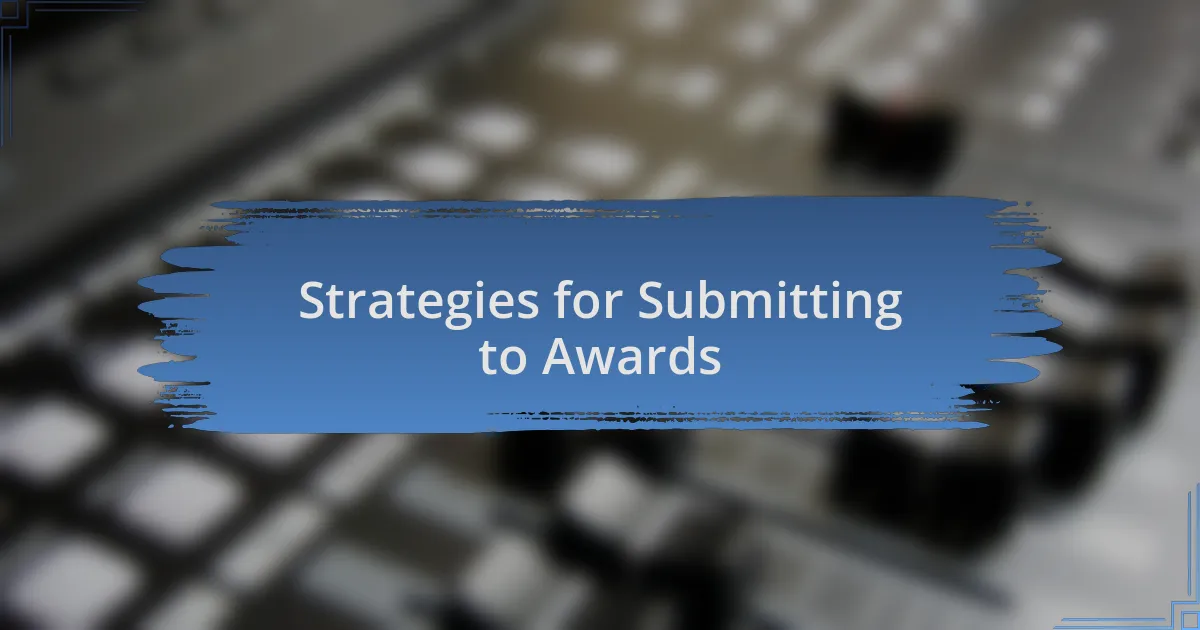
Strategies for Submitting to Awards
When it comes to submitting songs for awards, I’ve found that understanding the specific criteria of each contest can be a game-changer. It’s not just about the quality of your music but also how well it aligns with the judges’ expectations. I remember a time when I submitted a song without tailoring it to the theme of the award. The feedback was tough to swallow, but it taught me that relevance matters as much as creativity.
Networking plays a crucial role in the submission process too. I’ve reached out to previous winners and asked for their insights on what made their songs stand out. Their advice often highlighted the importance of a compelling narrative behind the lyrics. Have I ever thought about how sharing my personal story could shape my entries? I realized that emotional resonance could be the key to unlocking those coveted awards.
Finally, I can’t stress enough the value of meticulous preparation. Before each submission, I review my lyrics multiple times, focusing on clarity and emotional impact. In one instance, I was so close to table my entry, but I took a step back and refined the chorus, which then lifted the entire song. It makes me consider: wouldn’t a polished piece, crafted with care and attention, increase my chances of being recognized? It certainly has for me.